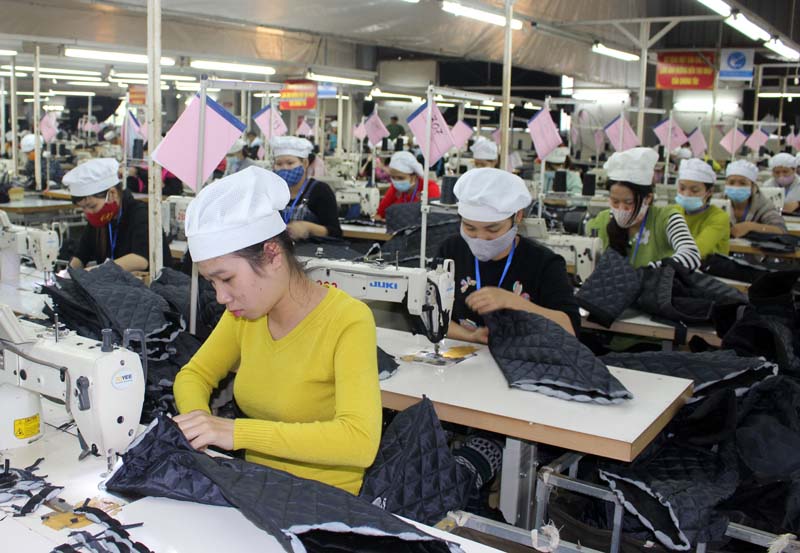
HBO - Industrial production in Hoa Binh province sustained the growth trend in the first quarter of 2019 thanks to the improved investment-business climate and rising consumption demand.
The local
industrial production value is estimated at 8.68 trillion VND (nearly 373.7
million USD) in Q1, up 17.46 percent year on year and equivalent to 23.21
percent of this year’s target.
 The Vietnam-Korea Garment JSC provides employment with
stable income for nearly 1,000 local workers.
The Vietnam-Korea Garment JSC provides employment with
stable income for nearly 1,000 local workers.
The processing and manufacturing industry has
maintained its role as the key driving force of industrial growth. Businesses
in the garment and electronics sectors whose activities are based on orders
have devised production plans to ensure efficient and uninterrupted operations.
In Q1, 1.678 billion kWh of electricity was
produced, including 204 million kWh of commercial power – up 11.48 percent from
the same period last year.
The output of products in the processing
industry, including garment, electronic devices, bricks, medium-density
fibreboardand cement, grew by 11 – 33 percent year on year. Major
contributors to industrial growth included lens production (up 26.5 percent)
and garment (20.96 percent).
Hoa Binh province is undergoing a dynamic transformation amid Vietnam’s national digital transition. Building on Poliburo’s Resolution No. 57-NQ/TW on breakthroughs in science, technology, innovation, and national digital transformation, the province has rolled out a wide range of practical action plans. A standout initiative is the "Digital Literacy for All” movement, an effort to ensure that no one is left behind in the digital era.
Hoa Binh province is undergoing a dynamic transformation in the wake of the national digital transformation movement. Building on Resolution No. 57-NQ/TW of the Politburo on breakthroughs in science, technology, innovation, and national digital transformation, the province has implemented a wide range of practical action plans. A standout initiative is the "Digital Literacy for All” movement ambitious effort to ensure that no one is left behind in the digital age.
With a spirit of unity and proactive problem-solving, the Party Committee, the government and the people of Dong Lai Commune (Tan Lac District) have made great strides in implementing the resolutions of the 24th Party Congress of the commune for the 2020 - 2025 term. Focusing on leadership and practical actions, the commune has brought the Party’s resolutions into daily life, creating strong impacts and pushing the local development forward.
Amid the nationwide push for digital transformation, young people in Hoa Binh Province are stepping up as dynamic pioneers, applying technology to enhance Youth Union operations and expand the reach of youth-led initiatives. Through creativity and adaptability, Youth Union organizations at all levels have introduced a series of practical solutions, contributing to modern governance and community development.
In recent years, An Nghia commune, located in Lac Son district, has stepped up administrative reform, focusing on improving the quality and efficiency of its single-window service unit for receiving and processing administrative procedures. These improvements have helped create favourable conditions for local residents and organisations to handle administrative procedures, contributing to the commune’s broader socio-economic development.
The Prime Minister-approved master plan to develop the multi-use value of forests ecosystems through 2030, with a vision to 2050, aims to improve the management and sustainable use of forest resources, create jobs, increase incomes, and improve the living standards of ethnic minorities, people in mountainous and remote areas, forest workers and those living near forests.



 The Vietnam-Korea Garment JSC provides employment with
stable income for nearly 1,000 local workers.
The Vietnam-Korea Garment JSC provides employment with
stable income for nearly 1,000 local workers.